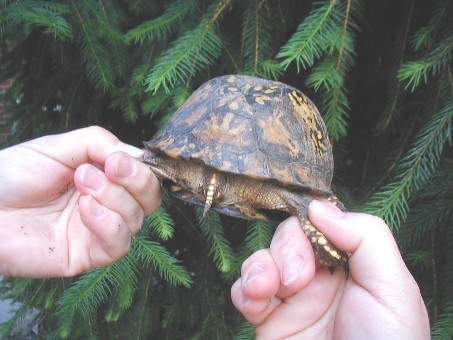To tell if a box turtle is pregnant, observe for weight gain, nesting behavior, and enlarged abdomen. Look for nesting spots in the enclosure and monitor the turtle’s activity for signs of pregnancy.
Box turtles may also exhibit changes in behavior and appetite during pregnancy. It’s important to consult with a reptile veterinarian for confirmation and guidance on caring for a pregnant box turtle. Understanding the signs of pregnancy in box turtles is crucial for their well-being and successful reproduction.
By observing their behavior and physical changes, you can provide the appropriate care and support for a pregnant box turtle. This ensures the health and safety of both the mother and her offspring.
Signs Of Pregnancy In Box Turtles
Box turtles can lay eggs without fertilization, so if you have a female box turtle, you should look for signs of pregnancy such as increased appetite, lethargy, and swelling around the cloaca. You may also notice that she is digging more frequently or exhibiting nesting behaviors.
Box turtles are fascinating creatures that make great pets due to their docile nature and relatively easy care. If you own a female box turtle, it’s important to know the signs of pregnancy so that you can provide the necessary care for a successful pregnancy and hatching. Here are the main signs to look out for:Changes In Behavior
One of the first things you may notice when your box turtle is pregnant is a change in her behavior. Pregnant box turtles tend to be more active and restless than usual, as they search for a suitable nesting site. You may also notice that your turtle is more aggressive or defensive than usual, as she tries to protect her developing eggs.Changes In Appearance
Another key sign of pregnancy in box turtles is a change in their physical appearance. Female box turtles will often gain weight and appear more rounded in the abdominal area. You may also notice that their plastron (bottom shell) is slightly raised and that their skin appears tighter than usual. In some cases, you may even be able to see the eggs through the skin. It’s important to note that these signs are not always foolproof indicators of pregnancy, as other factors such as illness or poor nutrition can also cause changes in behavior and appearance. However, if you notice these signs in combination with a lack of interest in food and water, it’s a good idea to take your turtle to a veterinarian for a check-up. In conclusion, being able to identify the signs of pregnancy in box turtles is crucial for ensuring the health and well-being of your pet. By paying close attention to your turtle’s behavior and appearance, you can provide the necessary care for a successful pregnancy and hatching.
Credit: m.youtube.com
Behavioral Changes To Look For
Behavioral Changes to Look for:
Nesting Behavior
Box turtles may exhibit nesting behavior when pregnant, such as digging in the substrate.
Increased Restlessness
Pregnant box turtles may show increased restlessness, pacing back and forth in their enclosure.
Physical Appearance Changes
Physical appearance changes can be a good indicator of pregnancy in box turtles. Observing the turtle’s weight gain and the appearance of a swollen abdomen can help determine if the turtle is pregnant.
Weight Gain
One of the first signs of pregnancy in a box turtle is weight gain. A pregnant box turtle may start to show a noticeable increase in weight as the eggs develop within her body. This change in weight can be observed by regularly weighing the turtle and monitoring for significant increases.
Swollen Abdomen
Another physical change that can indicate pregnancy in a box turtle is a swollen abdomen. As the eggs develop, the turtle’s abdomen may appear visibly swollen or distended. This change in appearance is a strong indicator that the turtle is carrying eggs and may be preparing to lay them.
Egg-laying Process
Understanding the egg-laying process of a box turtle is crucial for identifying if the turtle is pregnant. This process involves the preparation of a nesting site and the actual laying of eggs. By observing these stages, you can determine if a box turtle is pregnant and provide the necessary care for the nesting process.
Preparation Of Nesting Site
Before laying eggs, a pregnant box turtle will begin to exhibit nesting behavior, such as digging in the substrate to create a suitable site for laying eggs. This behavior is often observed in the spring or early summer months. The nesting site should be well-drained and consist of loose, moist soil, allowing the turtle to easily dig a hole for depositing the eggs.
Laying Eggs
Once the nesting site is prepared, the box turtle will lay its eggs. This process typically occurs during the early morning or late afternoon. The turtle will carefully position itself over the nest and proceed to lay its eggs one at a time. After each egg is laid, the turtle will cover them with soil using its hind legs, ensuring the eggs are well-protected in the nest.
Care For A Pregnant Box Turtle
Caring for a pregnant box turtle is crucial to ensure the health and well-being of both the mother and her offspring. Providing proper nesting areas and ensuring adequate nutrition are essential aspects of caring for a pregnant box turtle.
Provide A Suitable Nesting Area
Creating a suitable nesting area for a pregnant box turtle is vital for the successful incubation of her eggs. The nesting area should be a shallow container filled with a mixture of soil and sand, offering the ideal conditions for the turtle to lay her eggs. Ensure the nesting area is located in a quiet and secluded spot, mimicking the turtle’s natural nesting environment.
Ensure Proper Nutrition
Proper nutrition is essential for a pregnant box turtle to support the development of her eggs and maintain her overall health. Offer a well-balanced diet consisting of a variety of insects, leafy greens, and vegetables to ensure she receives the necessary nutrients. Supplement her diet with calcium to support eggshell formation and overall reproductive health.

Credit: www.boxturtleworld.com
Veterinary Assistance
If you suspect that your box turtle might be pregnant, seeking veterinary assistance is crucial for proper diagnosis and care. A qualified veterinarian or herpetologist can provide the expertise needed to determine the reproductive status of your turtle and offer guidance on how to proceed.
Consulting A Herpetologist
When you suspect your box turtle may be pregnant, consulting a herpetologist is a wise decision. These specialists have in-depth knowledge of reptile biology and can provide valuable insights into the reproductive behavior of box turtles. They can conduct a thorough examination and offer advice on caring for a pregnant turtle.
Ultrasound For Confirmation
If there are uncertainties about the pregnancy status of your box turtle, an ultrasound can be used for confirmation. This non-invasive imaging technique can help determine if the turtle is carrying eggs. A qualified reptile veterinarian can perform the ultrasound and provide you with a clear picture of your turtle’s reproductive health.
Important Considerations
When determining if a box turtle is pregnant, there are several important considerations to keep in mind. By understanding these factors, you can effectively monitor and care for a pregnant box turtle.
Avoid Disturbances
Minimize handling or disturbing a pregnant box turtle to reduce stress and potential harm to the eggs.
Monitor Health Closely
Regularly check the pregnant box turtle’s health to ensure she is eating, basking, and behaving normally.

Credit: www.indianaturtlecare.com
Conclusion
Identifying a pregnant box turtle requires keen observation of its behavior. Keep an eye on nesting activities and changes in appetite. Consulting a veterinarian for confirmation is advisable. Understanding these signs can help ensure the well-being of the turtle and its future offspring.






Leave a Reply